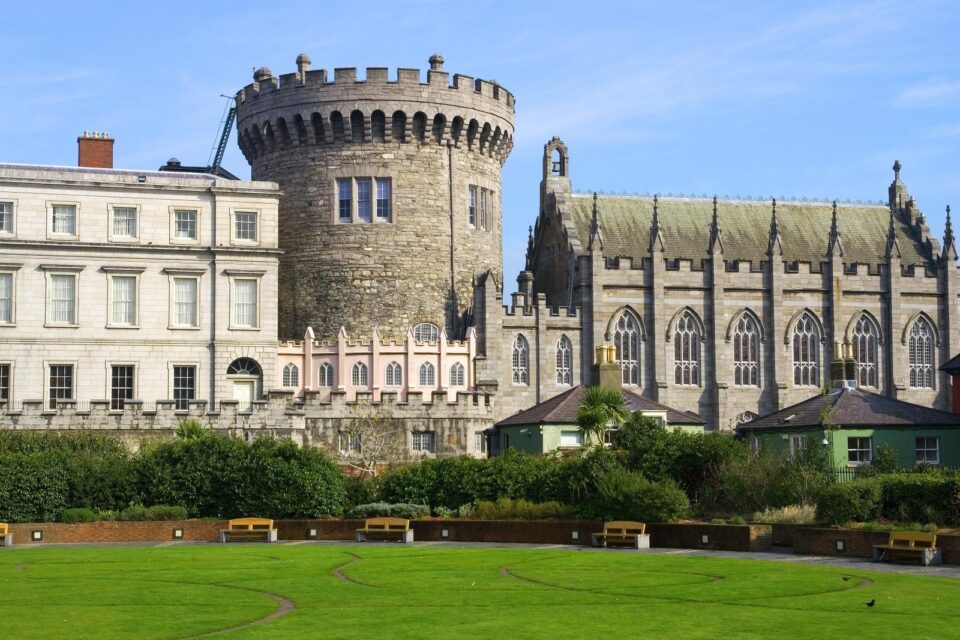Colorful Dublin fascinates tourists with the unique fun and independent atmosphere of Ireland and the indescribable proud spirit that has been formed for many centuries. And it also gives Dublin attractions that many European capitals can envy.
What to see in Dublin-getting ready for your trip
Of course, the capital of Ireland has such a huge number of interesting places that it is impossible to visit them all in a few days. We have made a selection of the most fascinating ones located close to each other, which are quite enough for two days to visit. When you go on a trip, take a map of Dublin’s attractions with photos and descriptions to create a comfortable route and have time to see as many interesting things as possible.
Kilmanham-Irish prison
What to see in Dublin in 2 days? Start with an incredibly atmospheric place – a former prison. Today, a museum is open here. In the period from the 18th to the beginning of the 20th century, the British authorities kept fighters for Irish independence in cells. Executions were carried out here, and it is not surprising that the atmosphere here is rather gloomy and creepy.
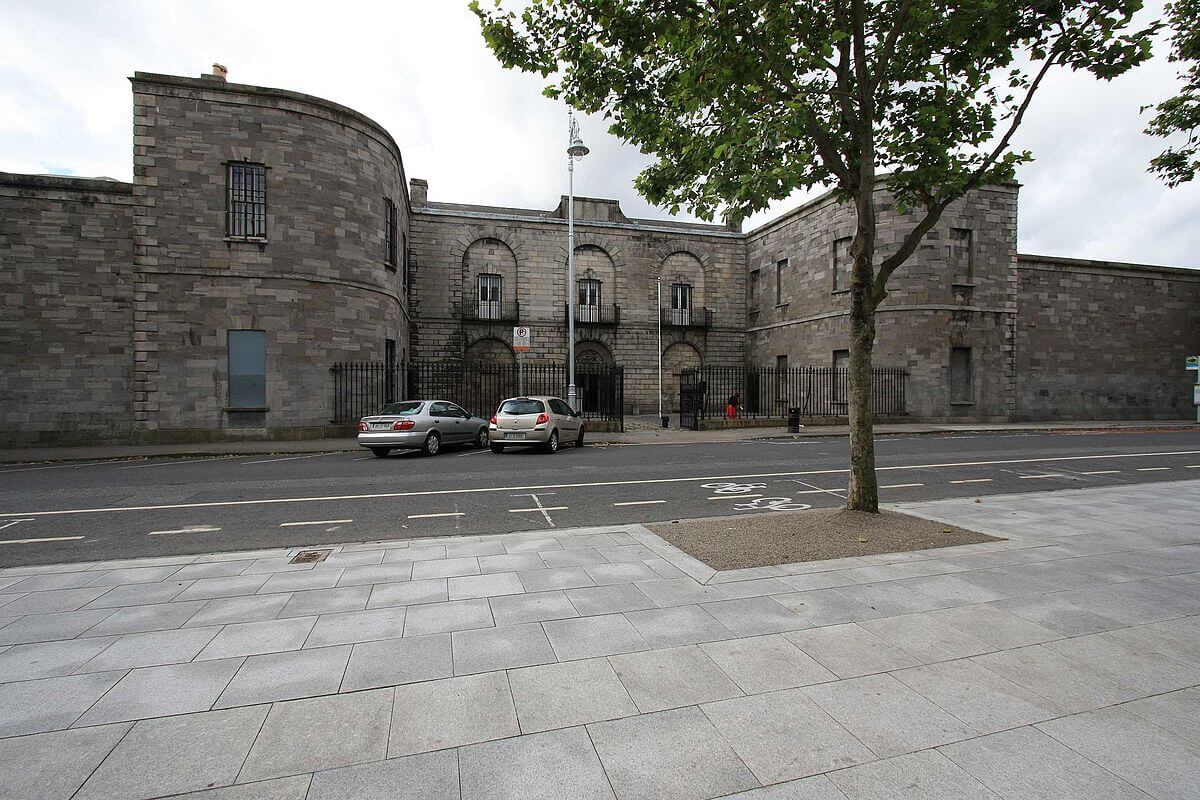
The building was built in the late 18th century and received the name “New Prison”. Prisoners were executed in the front, but executions became rare in the mid-19th century. Later, a separate execution chamber was built in the prison.
Interesting fact! Even seven-year-old children were among the prisoners. The area of each cell is 28 sq. m., they were shared and contained men, women and children.
By the way, it was very easy to get into an Irish prison – for the slightest offense, a person was sent to a cell. Poor people deliberately committed some crime in order to end up in prison, where they were fed free of charge. Prisoners from rich families could pay for a luxury cell with a fireplace and additional amenities.
The prison is a real maze where you can easily get lost, so keep up with the guide during the tour. Relax in Phoenix Park, which is located nearby, after a visit to the prison cells. There are deer here who are happy to eat a few fresh carrots.
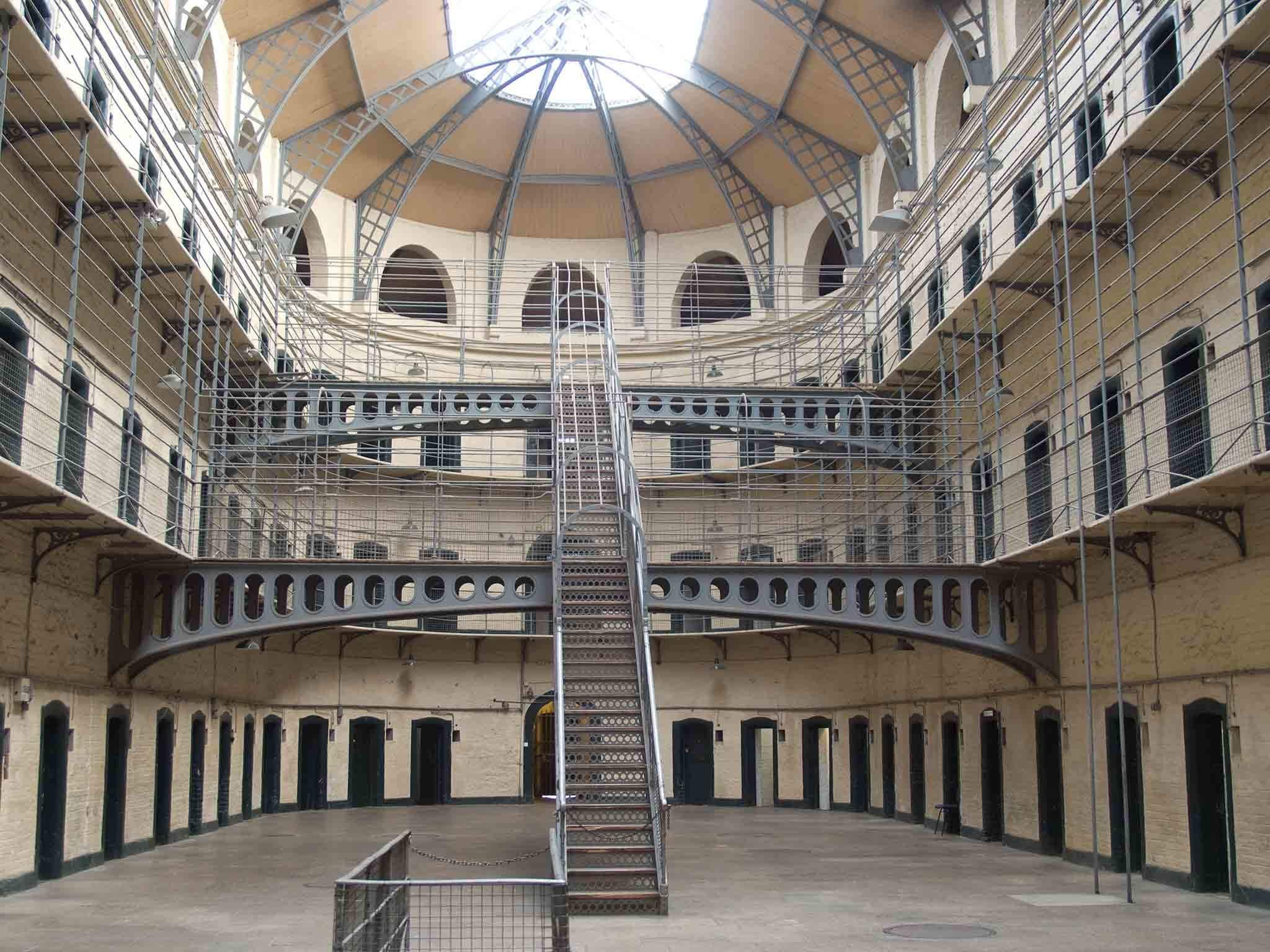
Practical information:
- Place of interest address: Inchicore Road, Kilmainham, Dublin 8;
- opening hours: daily from 9: 30 to 17: 15;
- admission fee: for adults 8 €, for people 60+ years-6€, for students and children 12-17 years-4 €;
- website: kilmainhamgaolmuseum.ie.
St. Stephen’s Green or St. Stephen’s Park
The city Park is 3.5 km long and is located in the centre of Dublin. Once representatives of the local aristocracy walked here, and only at the end of the 19th century the park was opened to all comers. This was largely facilitated by Guinness, the founder of a well-known brewery.
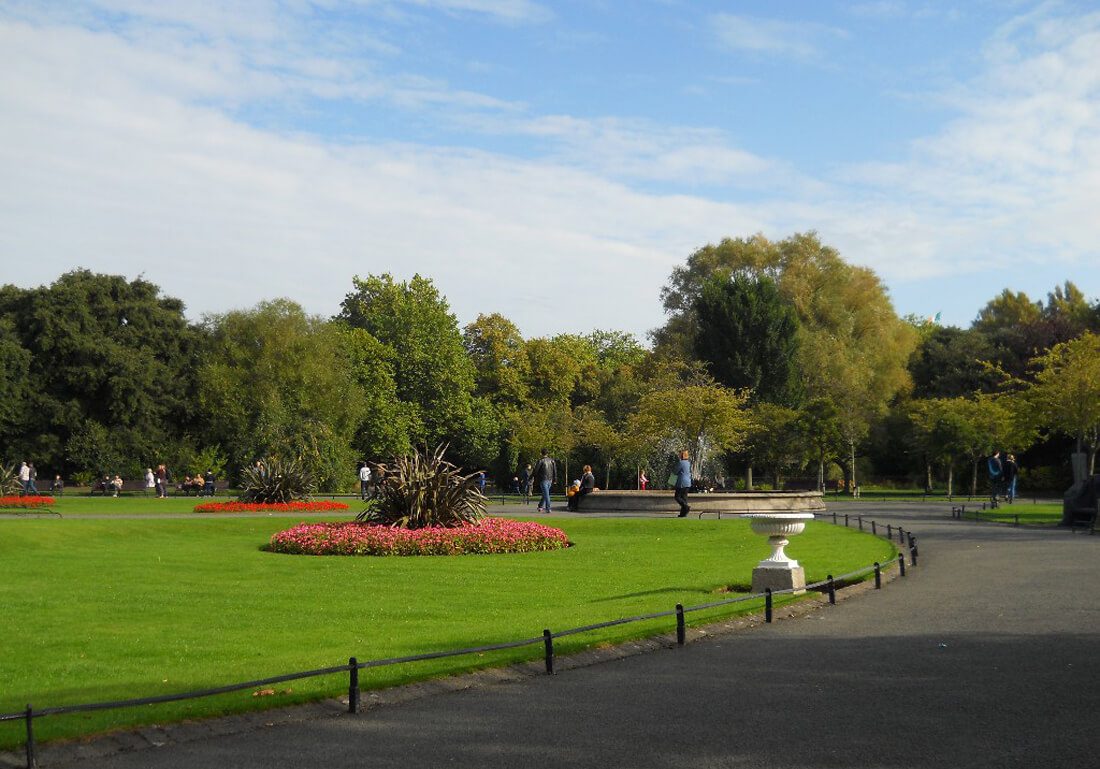
Interesting fact! Queen Victoria once suggested naming the park after her late husband. However, the townspeople categorically refused to rename the attraction.
While walking in the park, be sure to see the ornamental lake where birds live. A very interesting garden for the visually impaired. Children enjoy having fun on the playground. In the summer, concerts are held here, but so many people come that there are not enough benches for everyone. At lunchtime, the park is full of office workers who come to eat and relax.
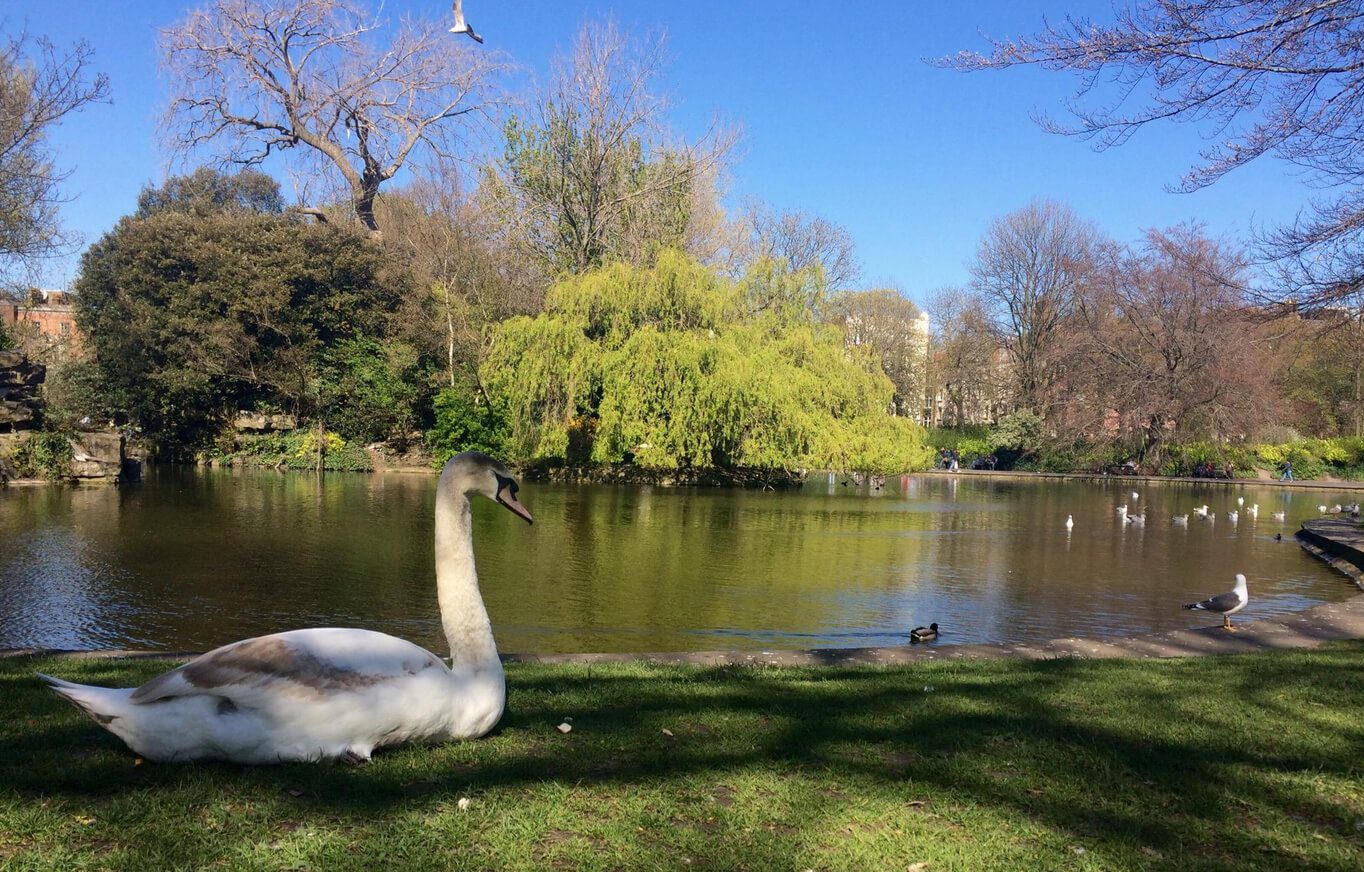
The main entrance to the park is through the Arch of Shooters, which is made by analogy with the Roman arch of Titus. On the territory of the attraction, wide, comfortable paths are laid, sculptures are installed on the sides. Because of the large amount of greenery, locals call the park an oasis in the stone, urban jungle.
Practical information:
- Location: St Stephen’s Green, Dublin 2, Ireland;
- in the park there are eateries, cafes, souvenir shops;
- you can relax on the grass, but in this case you will be in full view of all people, it is better to spend time actively-play badminton or rollerblade.
Trinity College and the Book of Kells
The school was founded in the late 16th century by Elizabeth I. The central entrance is decorated with sculptures of college graduates. There are many interesting sights stored here:
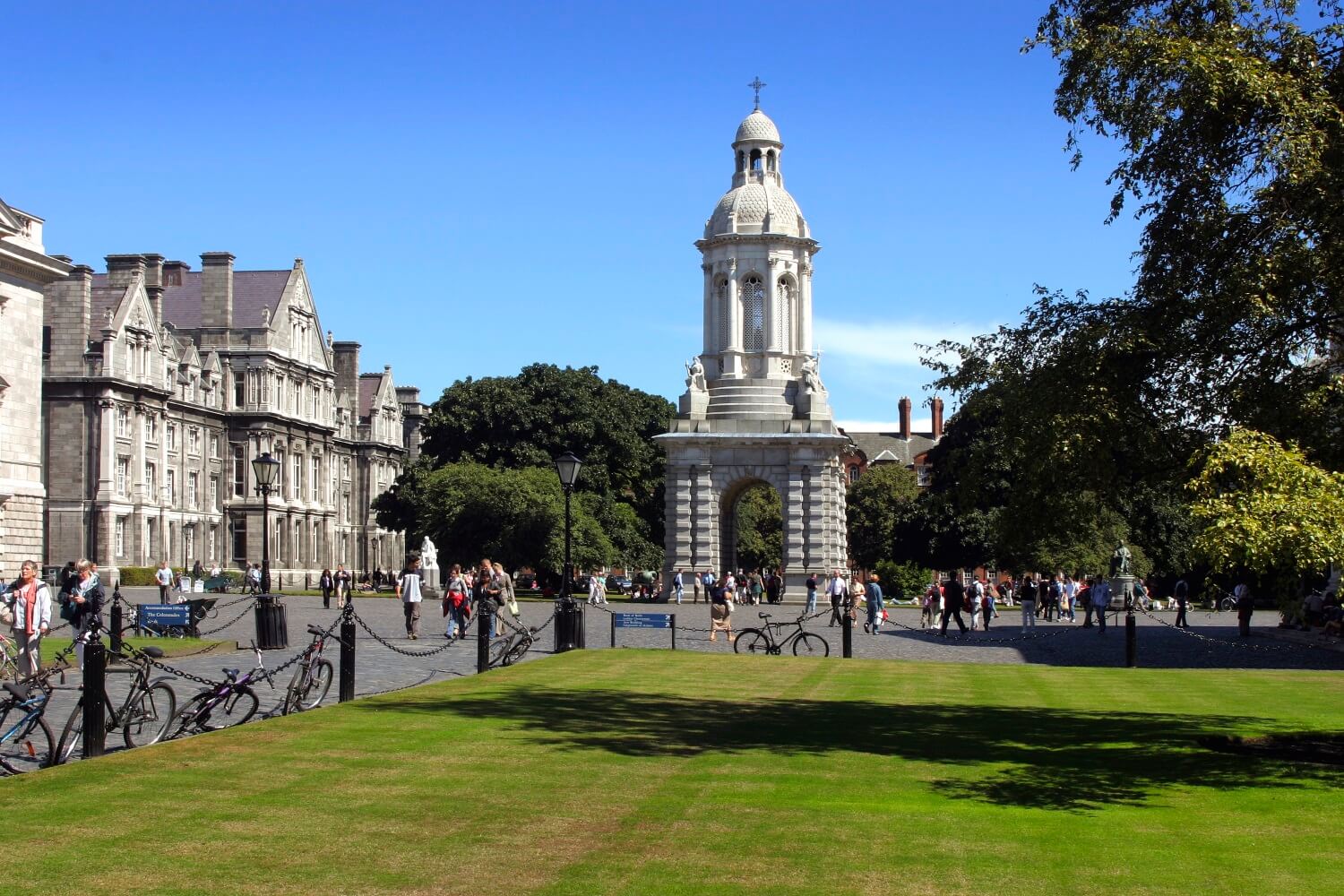
- ancient harp;
- a unique book of Kells dating back to 800 BC.
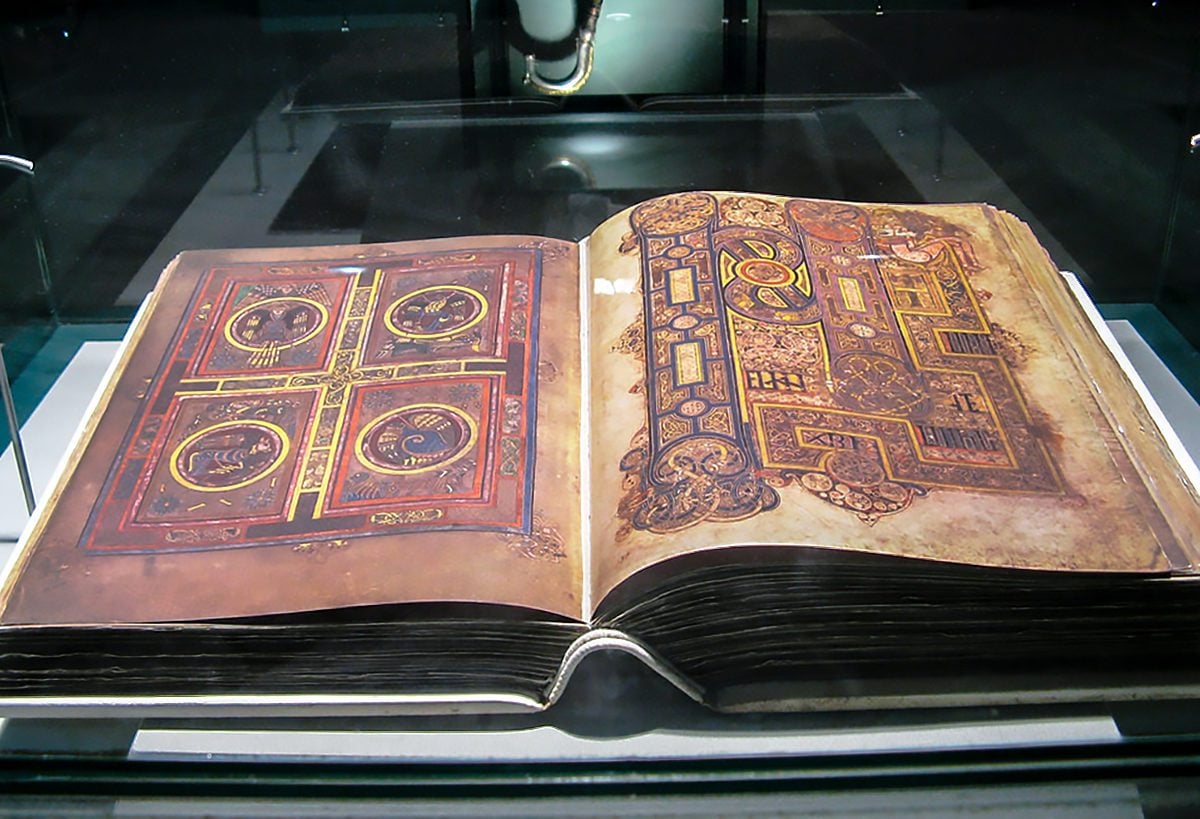
The book is a collection of four Gospels. This is an amazing collection of riddles, preserved for one thousand years. Scientists still can’t find out what paints were used for decoration, because they retained their rich color. Another mystery is how you managed to create thumbnails without using a magnifying glass. The history of the book is rich – it was repeatedly lost, stored in different places and restored. You can view the unique edition in the Trinity College Library.
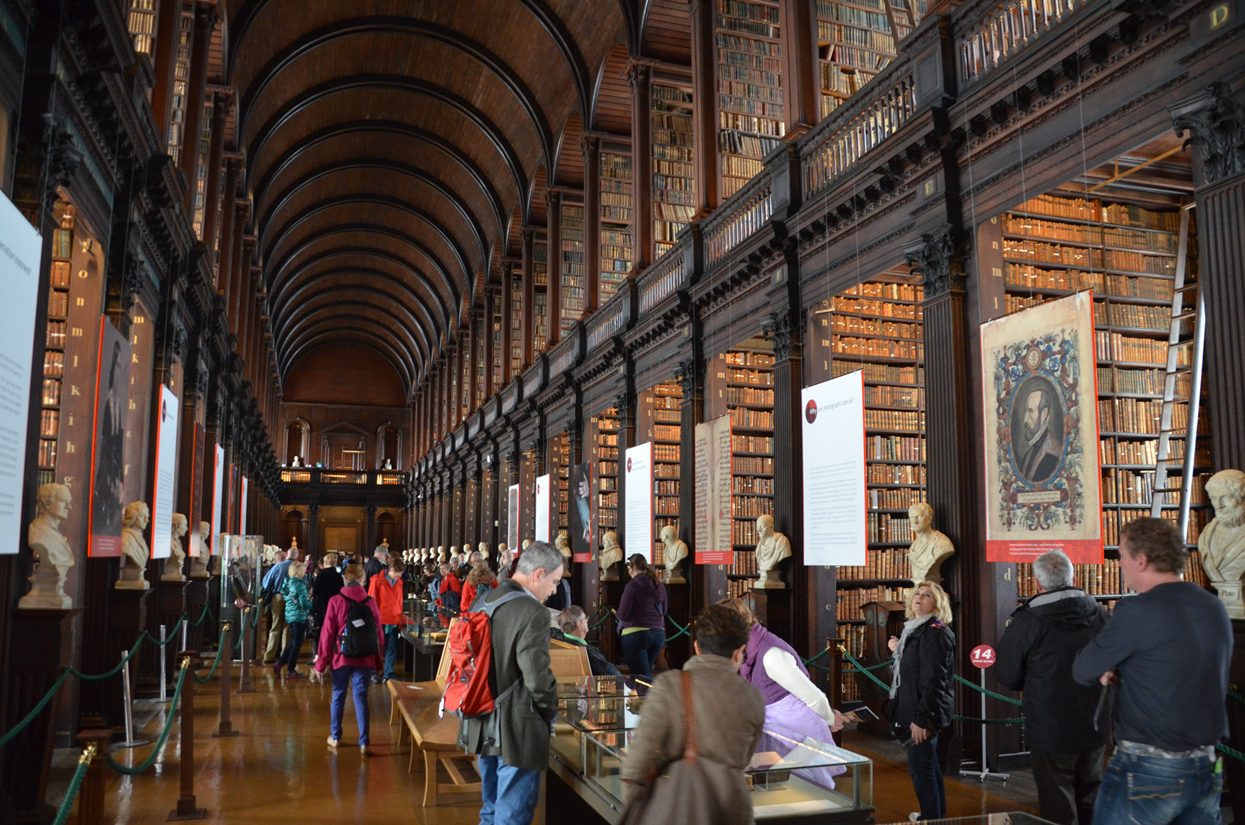
Practical information:
- Address: College Green, Dublin 2, Ireland;
- opening hours: daily from 9: 30 to 17: 00;
- cost of visit: 18,5€, the visit lasts for 30 minutes;
- website: www.tcd.ie.
Guinness World Records
Guinness is one of the most popular beer brands in the world. The history of this famous brand begins in the middle of the 18th century, when Arthur Guinness inherited 200 pounds and bought the entire brewery. For 40 years, Guinness has become a very wealthy man and passed the business to his sons. It was they who turned the family brewery into a global, successful brand known all over the world.
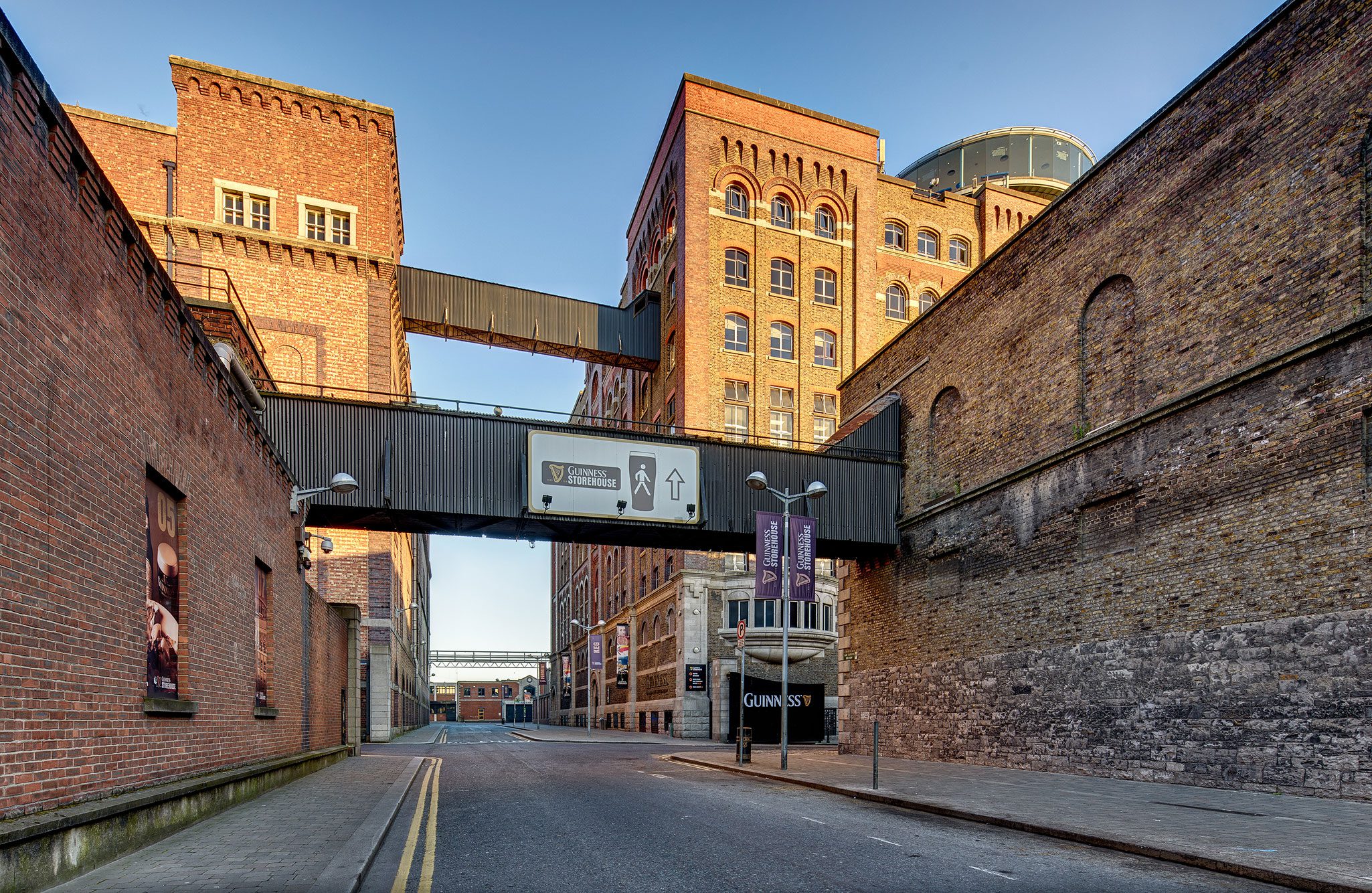
Interesting to know! The attraction can be found in the production room, which today is not used for its intended purpose.
Many exhibits can be viewed on the seventh floor. Here is the button that starts the release of a new batch of drinks.
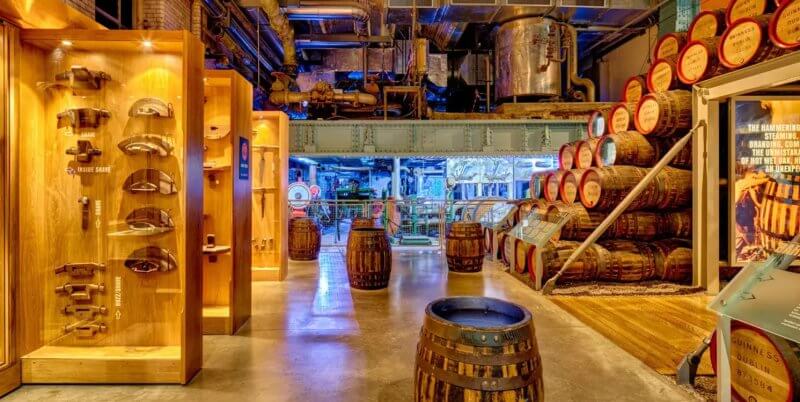
Interesting fact! The Gravitation pub is located in the museum complex, where you can exchange a ticket for a glass of foam drink. By the way-the pub is the best viewing platform in the city.
Practical information:
- address: St. James’s Gate Brewery, Dublin 8;
- opening hours: daily from 9: 30 to 17: 00, in the summer months – until 19: 00;
- ticket price: excursion only – 26 € for adults, 22 € for students and 10 € for children aged 5-17, factory tour + pint of beer 34 € and 29 € respectively (children are not served);
- website: www.guinness-storehouse.com.
Temple Bar
It would be an unforgivable mistake to come to Dublin and not visit the famous Temple Bar area. This is one of the most ancient areas of the city, where a large number of cafes, pubs and shops are concentrated. Life on the streets of this area does not stop even at night, people are constantly walking here, looking into endless entertainment venues.
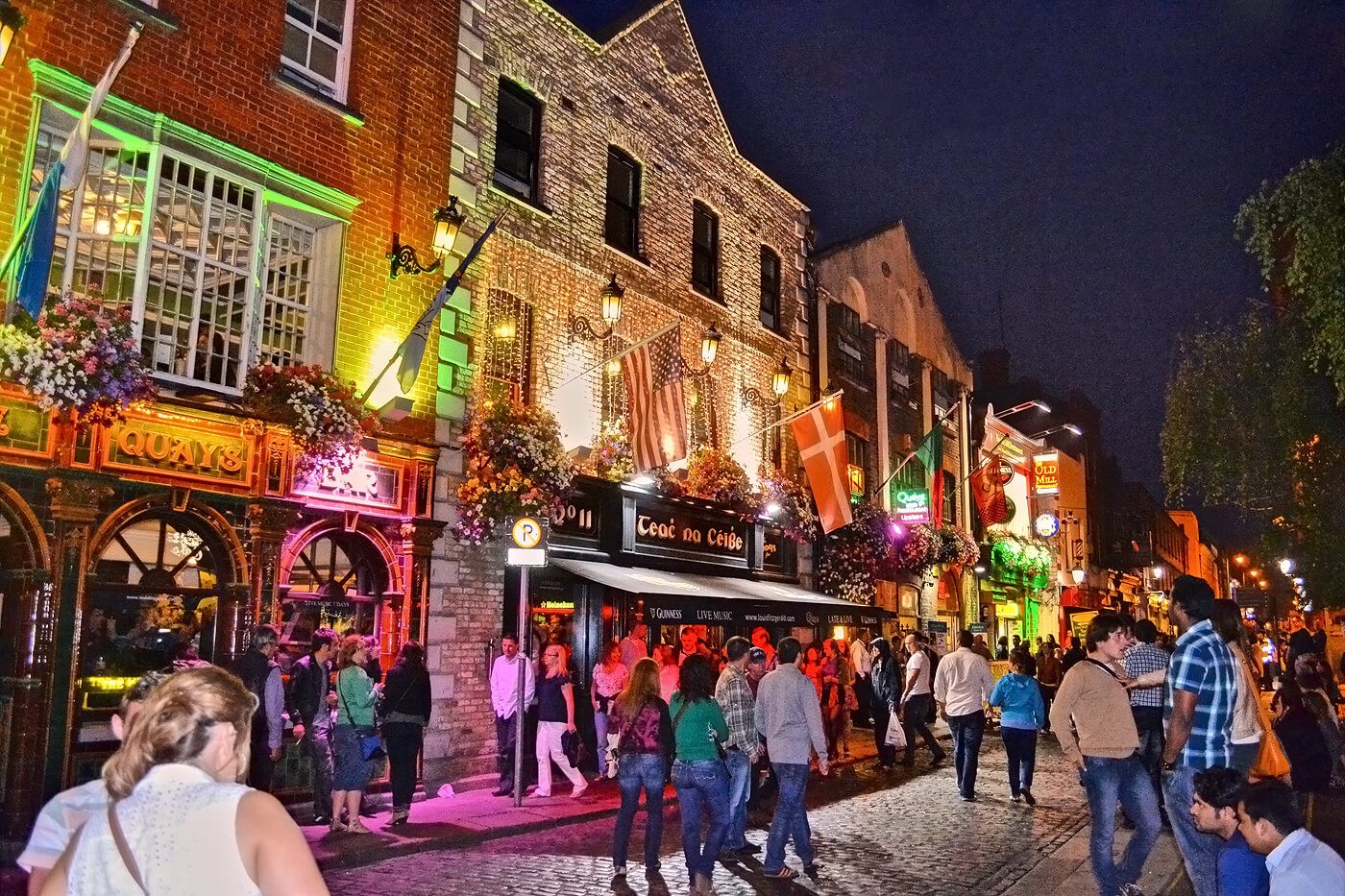
Interesting fact! The word bar in the name of the district does not mean a drinking establishment at all. The fact is that earlier the Temple’s possessions were located on the river bank, and in translation from Irish the word “barr” means a steep bank.
Locals and tourists note that the area, despite its active life and large crowds, is quite calm in terms of theft and other crimes. If you decide to see a tourist attraction at night, you are not in danger except for a lot of positive impressions.
What else to see in the Temple Pub area:
- the oldest pub in operation since the 12th century;
- the oldest theater building;
- a Victorian-style theater;
- the smallest theater in the country;
- a popular cultural center.
EPIC-Museum of Irish Emigration
The attraction tells in detail about the people who left Ireland in different years in search of a better life. The exhibition covers a period of 1500 years. This is the only fully digital museum in the world where you can not only see the exhibits, but also relive each story together with the narrator. Modern galleries are equipped with touch screens, audio and video systems. Fascinating stories are told by revived characters from the past.
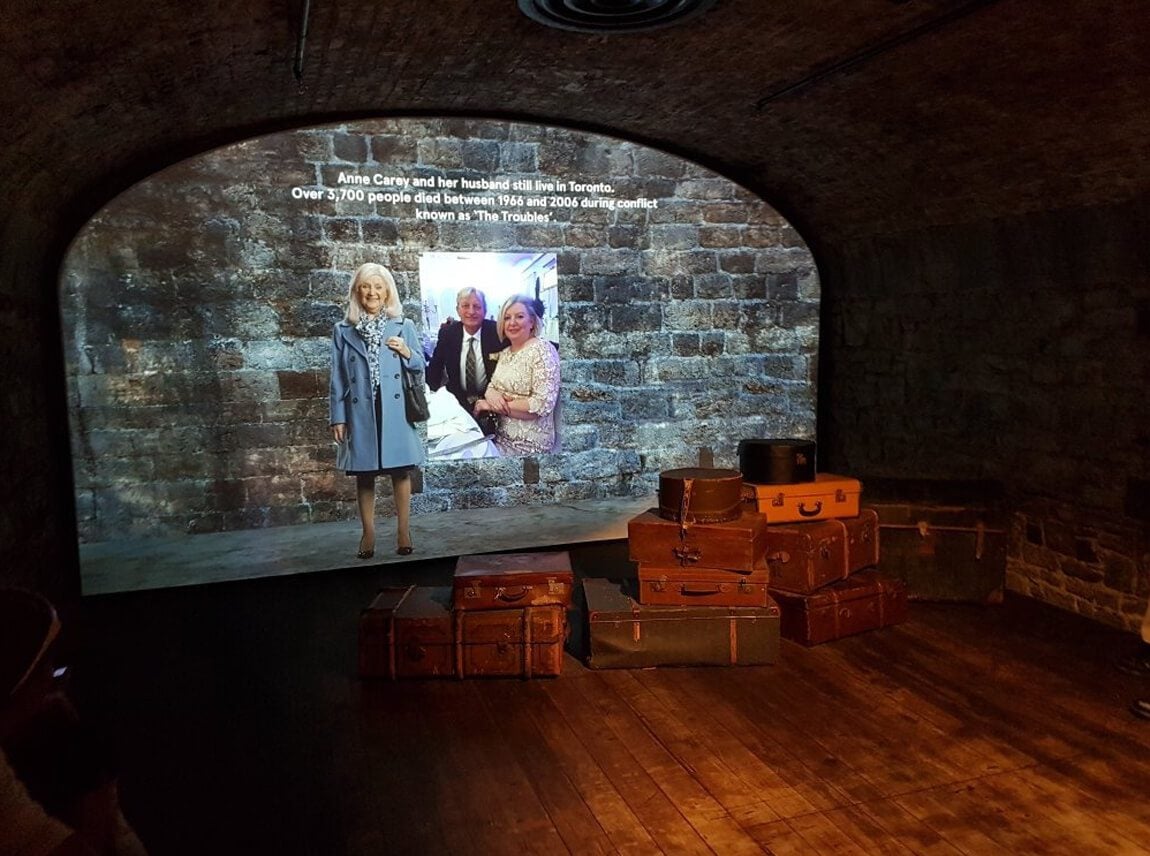
Practical information:
- Address: CHQ, Custom House Quay, Dublin 1 (10 minutes ‘ walk from O’Connell Bridge);
- opening hours: daily from 10: 00 to 18: 45, last entrance at 17: 00;
- ticket prices: adults (18-64 years old) – 21 € at the box office and 19 € online on the official website, teenagers 13-17 years old — 13.5 € (12.5 € on the website), children from 6 to 12 years old-10.5 € (9.5 €), for children under 5 years old admission is free;
- Dublin Pass holders can visit this Dublin landmark for free;
- website: epicchq.com.
Irish Whiskey Museum
The landmark is located opposite Trinity College, in the center of Dublin. This is the second museum dedicated to the national drink. It was founded in 2014 and quickly became one of the most visited and popular tourist destinations. This is a museum complex, which consists of three floors, a cafe, a souvenir shop and a McDonnell’s bar.
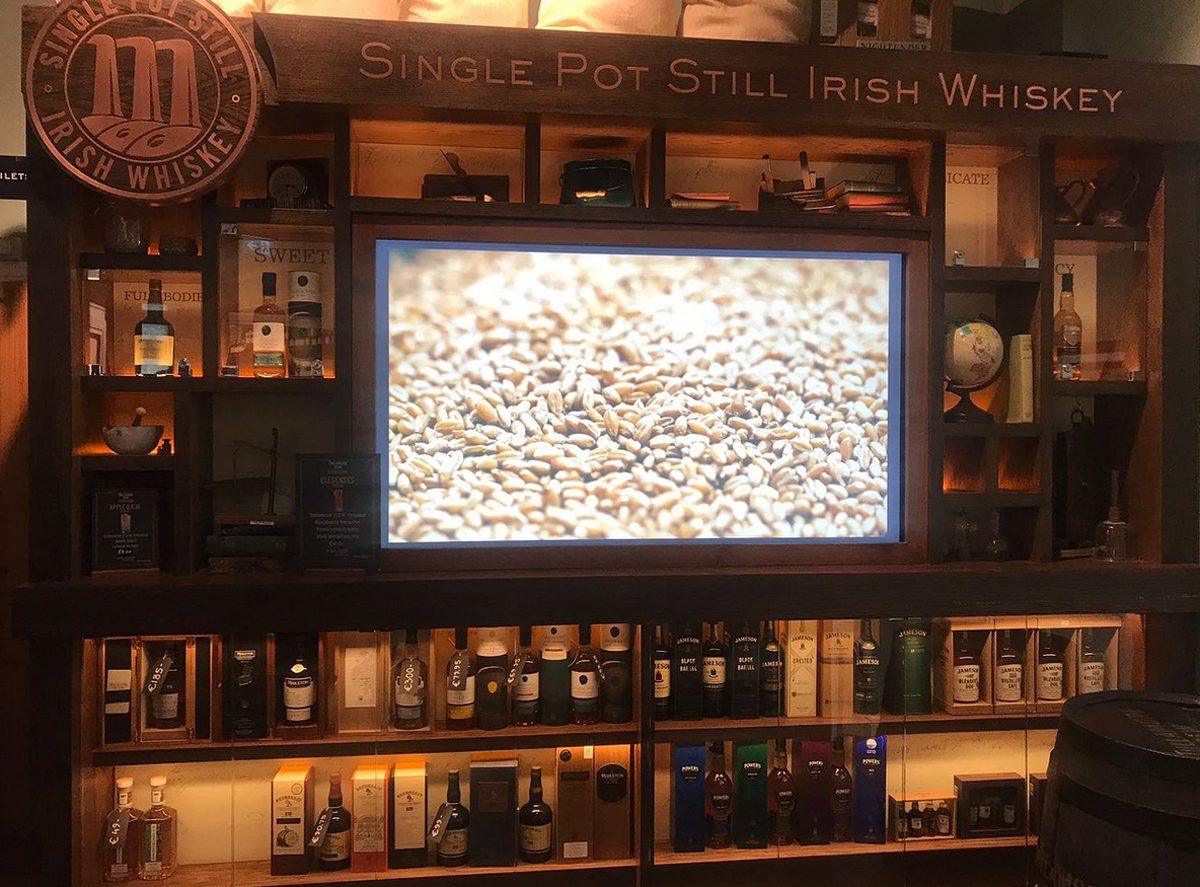
The pride of the museum is the largest collection of whiskey, here you can see unique varieties of the drink. Some exhibits are interactive and introduce visitors to the whiskey production process.
Interesting fact! Almost 2 million euros have been invested in the creation of the project.

Practical information:
- Address: 119 Grafton Street / 37, College Green, Dublin 2;
- opening hours: from 10: 00 to 18: 00, the first tour starts at 10: 30;
- ticket price: adult – 22 € (with 3 drinks tasting), adult without tasting-16 €, for students and seniors-20 €, discounts are available until noon;
- Dublin attractions website: www.irishwhiskeymuseum.ie.
Glasnevin Cemetery
To see the attraction, you need to go to the north of Dublin. The cemetery is popular because it is the first Catholic necropolis that was allowed to exist separately from the Protestant one. Today it is a unique museum, burials on the territory of the cemetery are no longer held. Many famous figures in the field of politics, active fighters for independence, soldiers, poets and writers are buried on Glasnevin.
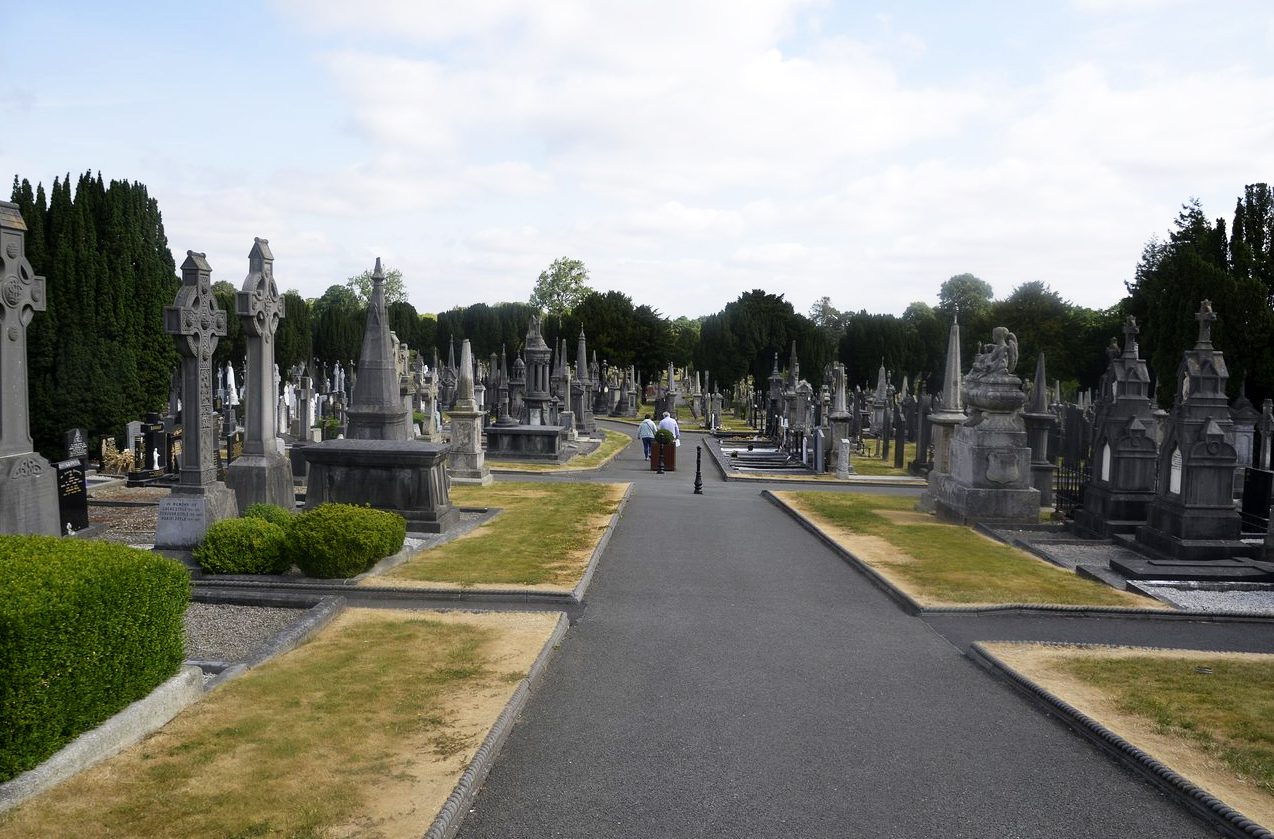
There has been a cemetery since 1832, since then its area has increased significantly, and it covers 120 acres. The total number of graves already exceeds one million. Along the perimeter of the territory is fenced with a metal fence with observation towers.
Interesting fact! The main attraction of the cemetery is the gravestones made in the form of Celtic crosses. Here you can see the crypts that are amazing in their scope and design.
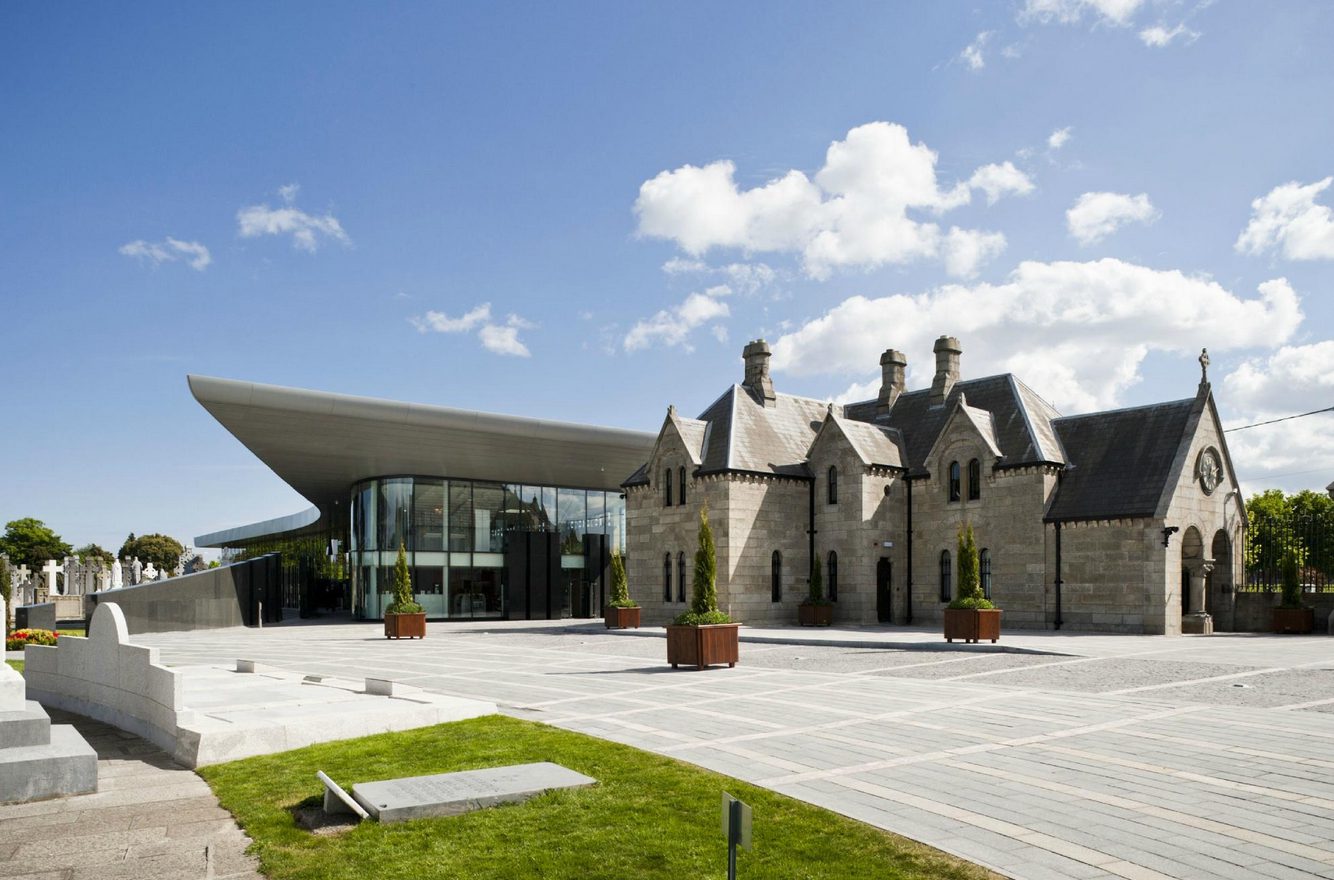
The cemetery has a museum located in a glass building, tourists are told about the history of the creation of Glasnevin. With special trepidation, visitors come to see the Angel’s Corner – a place where more than 50 thousand newborns are buried. This place is shrouded in mystery and mysticism.
The cemetery is located a ten-minute drive from the central part of Dublin. Entrance to its territory is free of charge.
Jameson Distillery
If you arrive in Dublin and don’t visit the Jameson Distillery, your trip will be in vain. The landmark is considered one of the most significant and revered not only in the capital, but also in the whole of Ireland. It is here that the world’s most popular whiskey is produced. Given that the tasting of the drink is included in the program of the visit, the tour of the museum promises to be not only fascinating, but also fun.

Interesting fact! Every tourist who visits the distillery receives a Whisky Taster certificate.
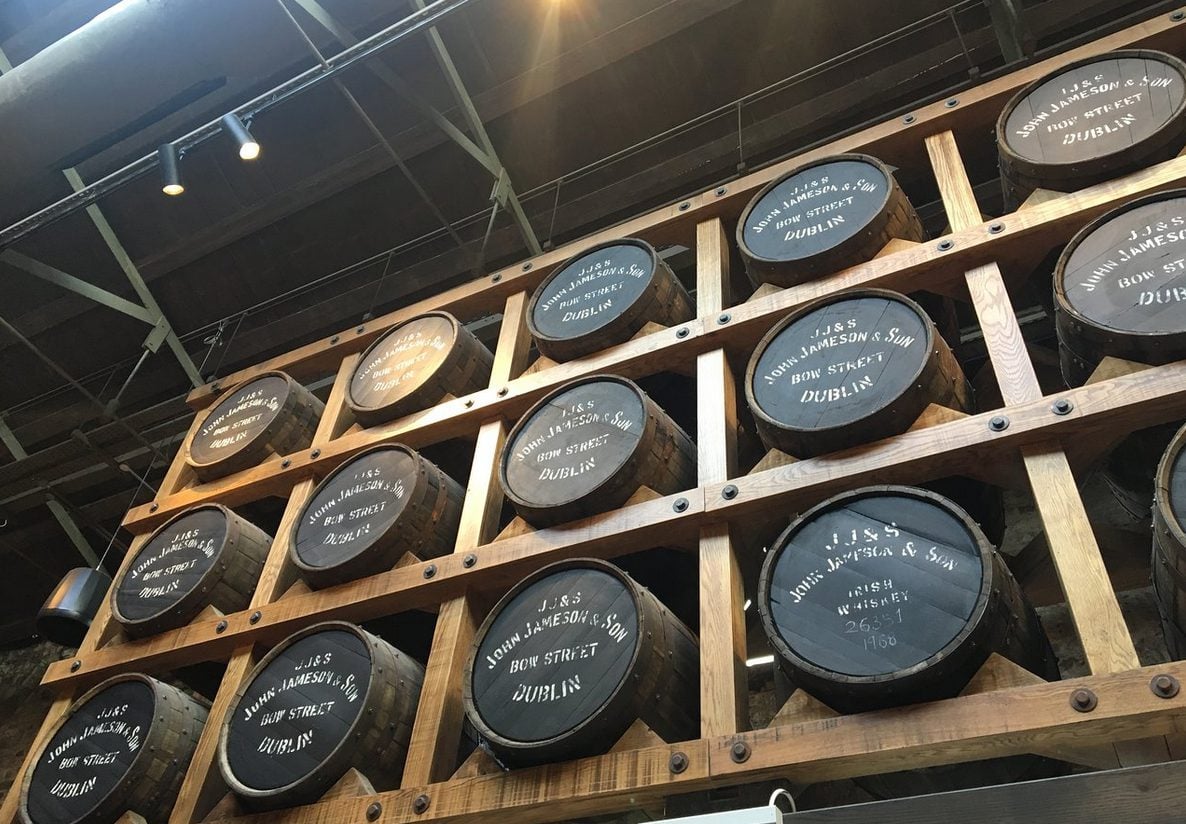
The attraction is located in the historical part of the capital, where you can see many interesting places. As for the distillery, the fascinating journey begins with the remarkable facade of the building, which is completely preserved from the 18th century. Already in the lobby of the museum, tourists feel the unique atmosphere of the production of the national Irish drink. The tour lasts one hour – during this time, guests can see and learn a lot of interesting things about whiskey and its production. The exhibits include distillery equipment – stills, vintage distillers, containers where whiskey is aged for the required period of time, as well as branded bottles of the brand.
From spring to autumn, the museum hosts themed parties every Thursday and Saturday, flavored with aged Irish whiskey and folk music.
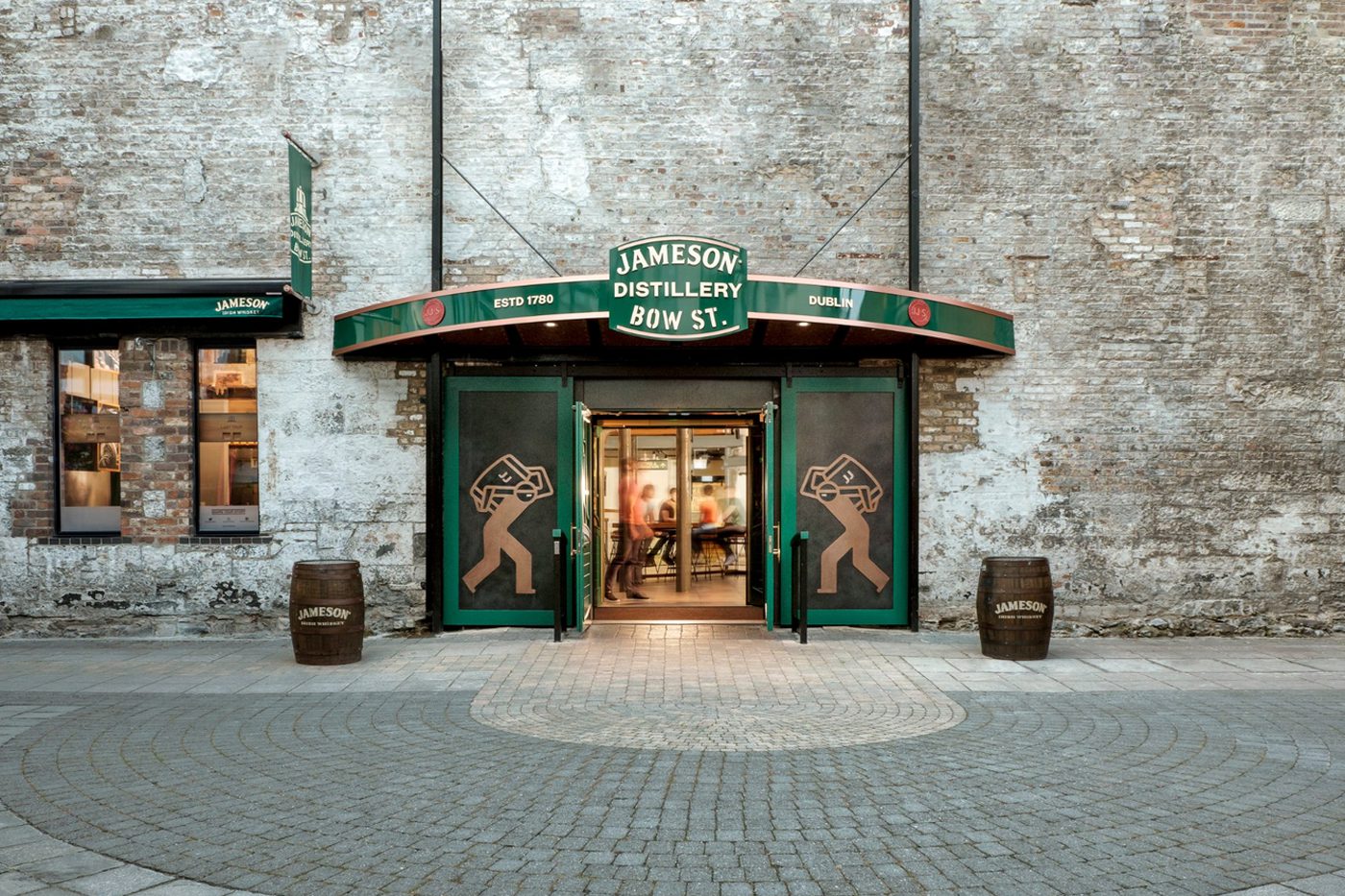
Practical information:
- address: Bow St, Smithfield, Dublin 7, D07 N9VH, Ireland;
- tourist reception schedule: every day from 10: 00 to 18: 00;
- guided tours are held at intervals of 15-30 minutes and cost from 26 € to 120 € depending on the chosen program;
- website: www.jamesonwhiskey.com.
Dublin Castle
The attraction was built by order of the monarch John the Landless. In the 13th century, this building was the most modern in Ireland. Today, conferences and important diplomatic meetings are held here.
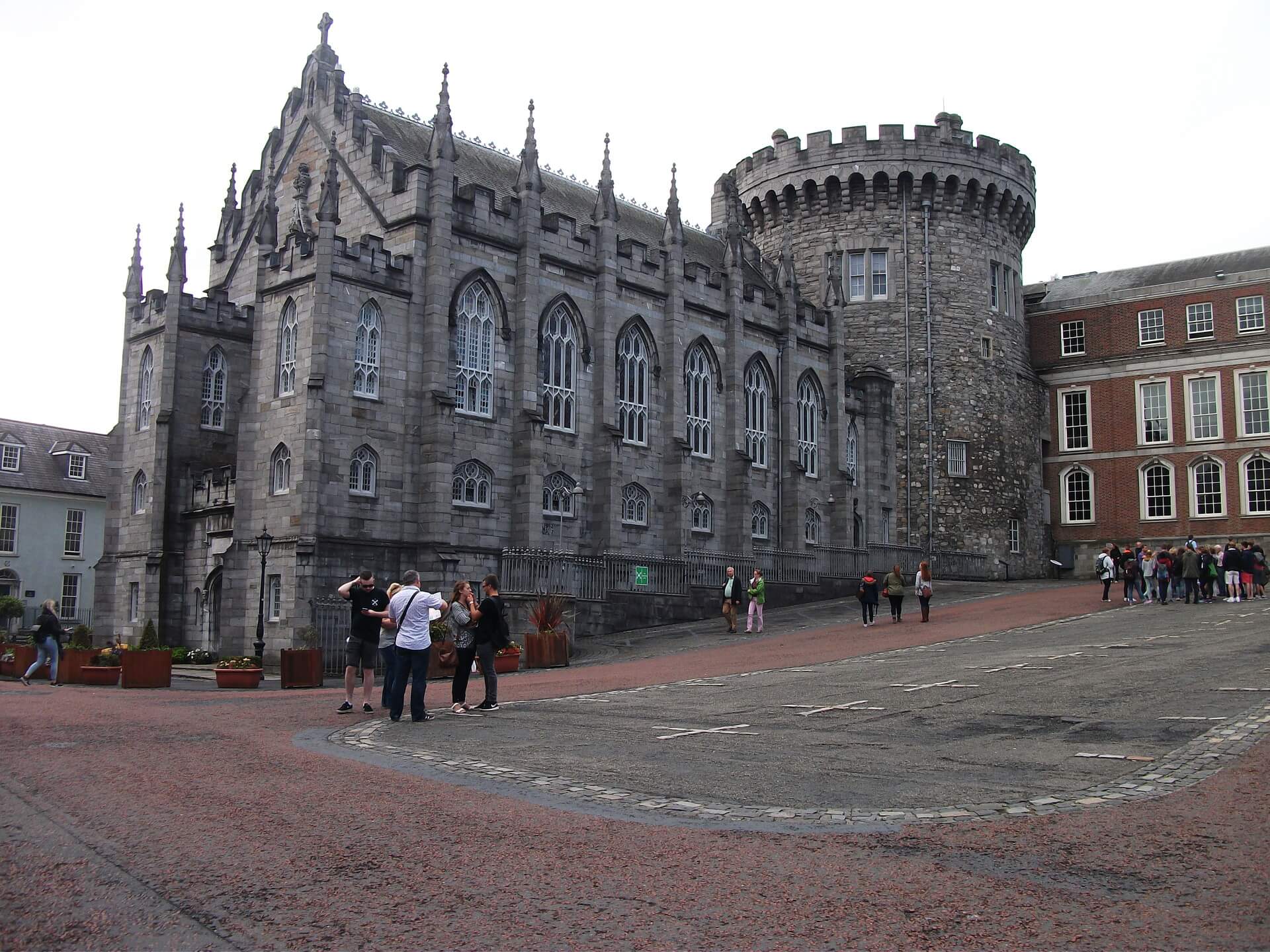
Practical information:
- Address: 16 Castle St, Jamestown, Dublin 2;
- Opening hours:9: 45 to 17: 45 daily;
- ticket price: for adults – 8€, for students and pensioners-6 €, for children from 12 to 17 years-4 € (the ticket entitles you to visit the Arts Center, Birmingham Tower and Holy Trinity Church);
- there is a cafe in the castle’s underground area where you can eat;
- website: www.dublincastle.ie.
National Museum of Ireland
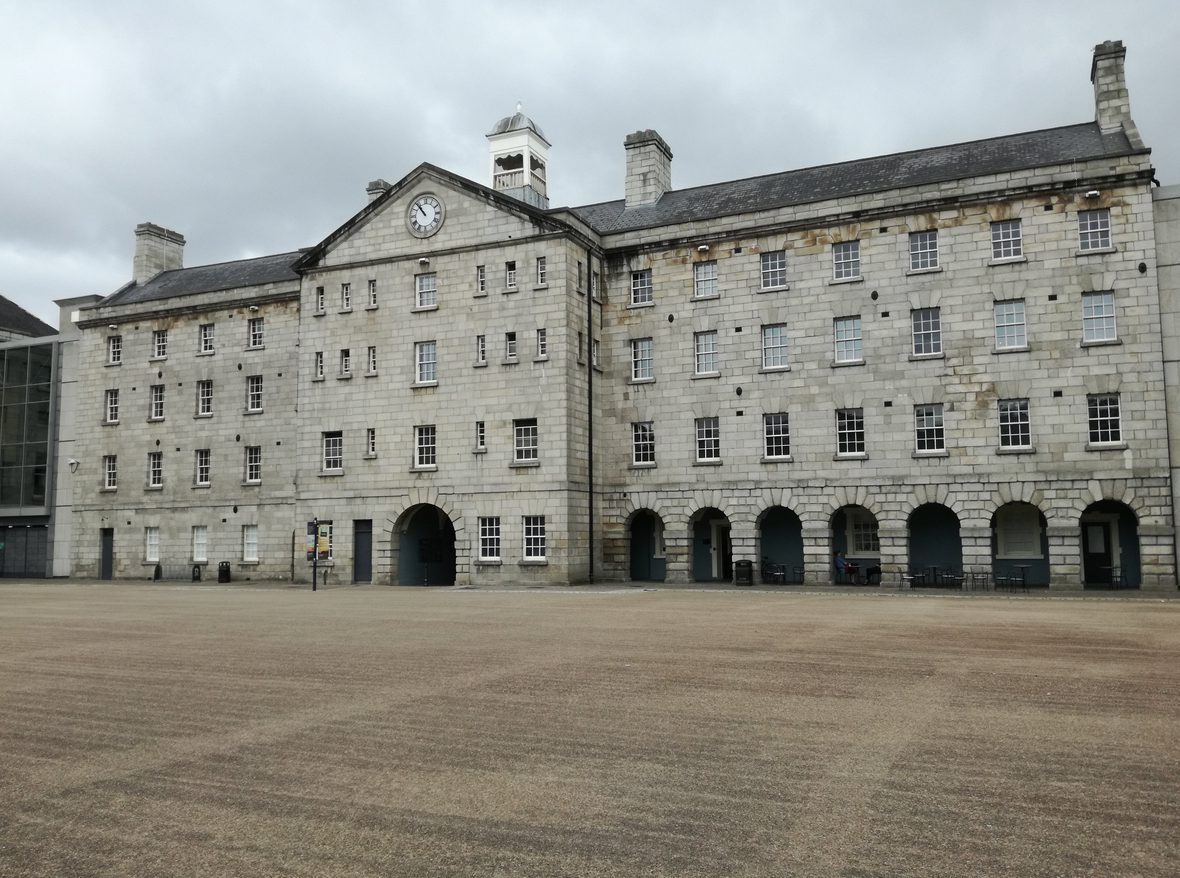
The list of attractions in Dublin and the surrounding area includes a unique museum complex, founded in the late 19th century. Today, this exhibition space hardly has analogues around the world. The capital’s landmark consists of four branches:
- the first one is dedicated to history and art;
- The second is natural history;
- The third is archeology;
- The fourth one concerns agriculture.
The first three branches are located in Dublin, and the fourth is located in the village of Tarlow (County Mayo).
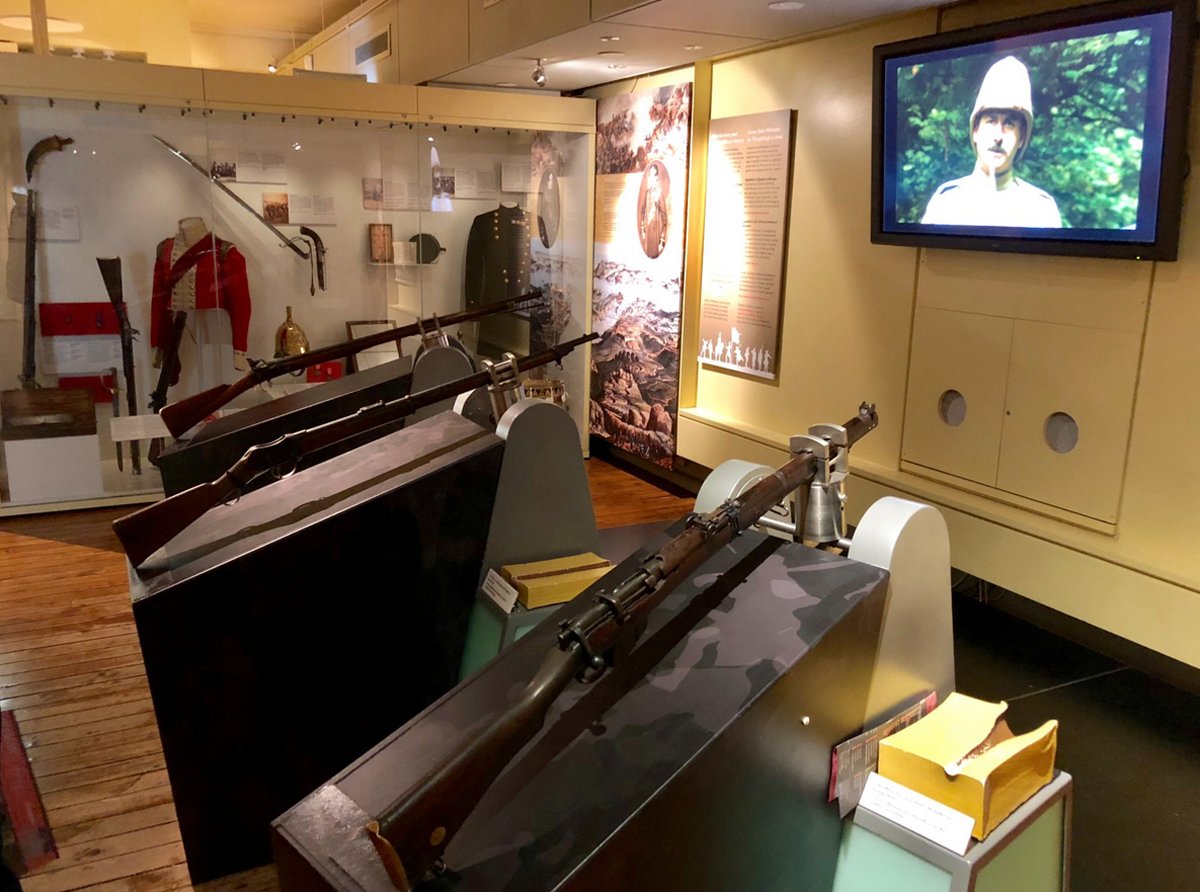
The first branch is located in the building where the army garrison used to be located. The museum’s exhibits moved here only in 1997. Here you can view local household items, jewelry, and religious exhibits. In this part of the museum, the Irish Army is presented in detail.
Address: Benburb Street, Dublin 7, easy 30-minute walk from Dublin city center or take the 1474 bus.
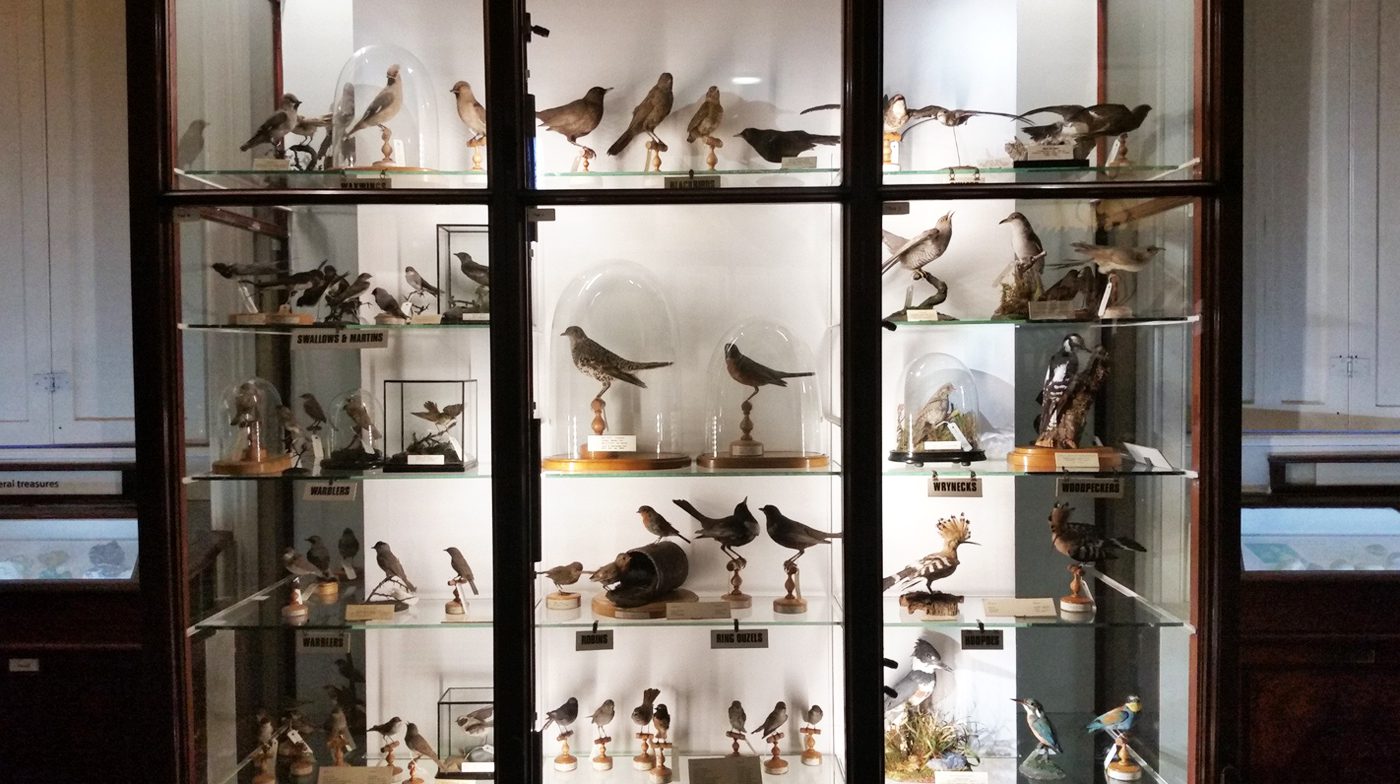
The second branch was founded in the middle of the 19th century, since then its collection has not changed much. For this reason, it is called the museum of the museum. Among the exhibits are rare representatives of local fauna and a geological collection. The attraction is located on Merrion Street, near St. Stephen’s Park.
In the Museum of Archaeology, you can view a unique collection of all cultural monuments found on the territory of Ireland – jewelry, tools, household items. The third branch is located next to the Natural History Museum.
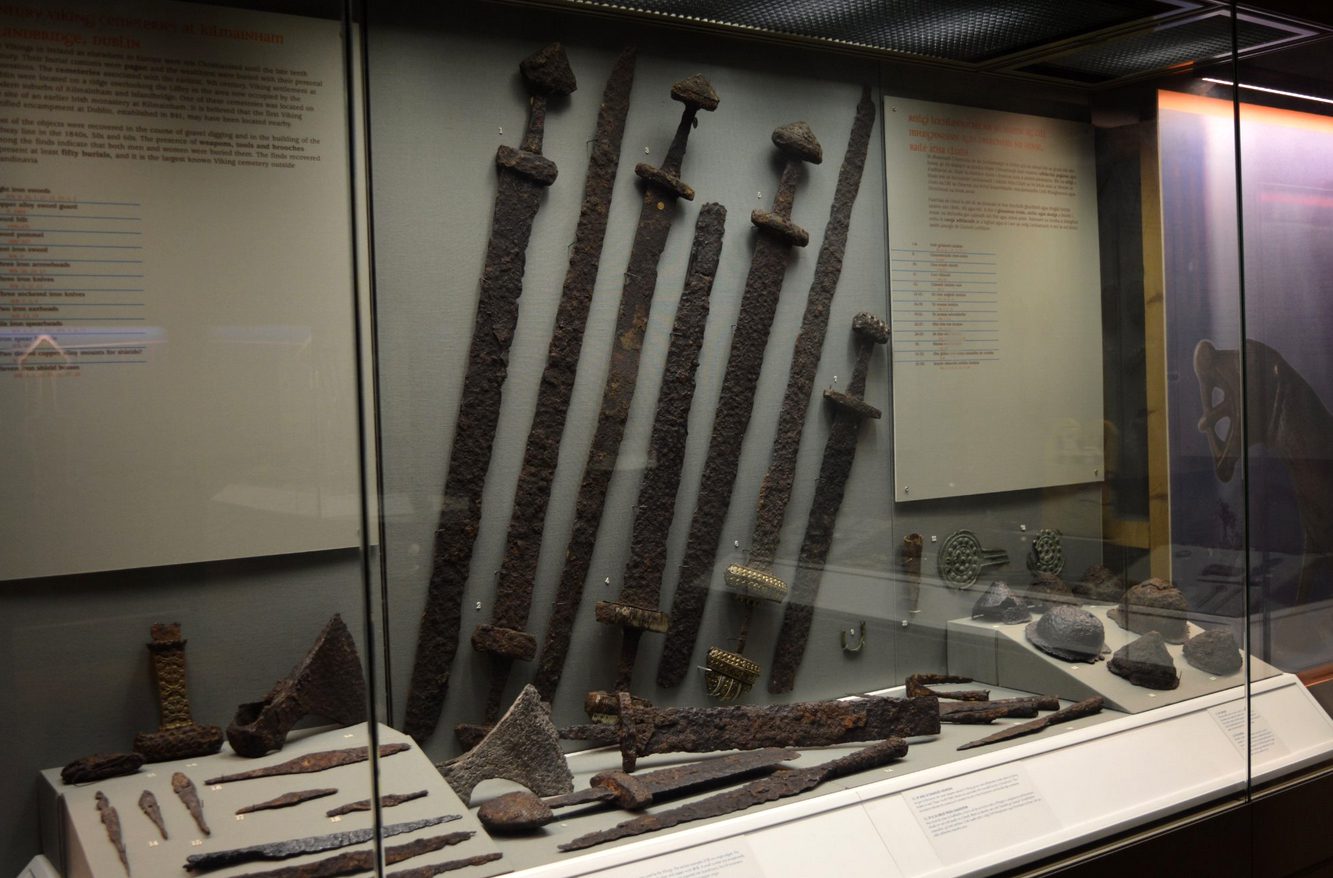
The fourth branch, located outside of Dublin, is a modern museum space that explores Ireland’s agriculture in the 18th century. You can get here by train, bus or car.
Practical information:
- Address: Garrison Chapel, Beggars Bush Barracks, Haddington Road, Dublin 4, D04 E0C9, Ireland;
- visiting hours: Tue. – Fri. – 10: 00-16: 00, Sat. – Sat. – 12: 00-16: 00, Monday-closed;
- ticket price: 5 € standard, 4 € reduced;
- site of the tourist attraction: www.nationalprintmuseum.ie.
Dublin Zoo
Here you will find something to see for both adults and kids. Since 1999, the zoo has been operating a themed area dedicated to pets and birds. There are goats, sheep, canaries, guinea pigs, rabbits and ponies. There are also zones dedicated to South American animals, cats, African inhabitants and reptiles. For all animals, conditions are created that are as close to natural as possible.

Interesting fact! A lion grew up in Dublin Zoo, which later became a Hollywood star – millions of viewers see it in the splash screen of the Metro-Goldwyn-Mayer film company.

It is recommended to schedule at least five hours to visit the attraction. It is best to visit the zoo in the summer, because in the cold season many animals hide and are invisible. Here you can come for the whole day-to see animals, eat in a cafe, visit a souvenir shop and just walk around the Phoenix City Park, where the attraction is located.
Practical information:
- Location: Phoenix Park;
- opening hours: Tue. — Fri. – 10: 00-16: 00, Sat. – Sat. – 12: 00-16: 00, Monday-closed;
- ticket prices (at the ticket office/online on the website): adult – 22.5 / 19€, children from 3 to 15 years – 17/14€, for seniors (65+) and students-17.5/14.5 €, for children under three years of age admission is free;
- book tickets on the zoo’s website – in this case they are cheaper;
- website: dublinzoo.ie.
St. Patrick’s Cathedral
The largest church in Ireland, dating from the 12th century. Since that time, an entire architectural complex has been built near the cathedral, along with the Archbishop’s palace. Many attractions can be found on its territory. The most memorable one is the monument to Jonathan Swift. Many people know him from the fascinating adventures of Gulliver, but few people know that he was the rector of the cathedral. Be sure to take a walk in the garden adjacent to the cathedral.
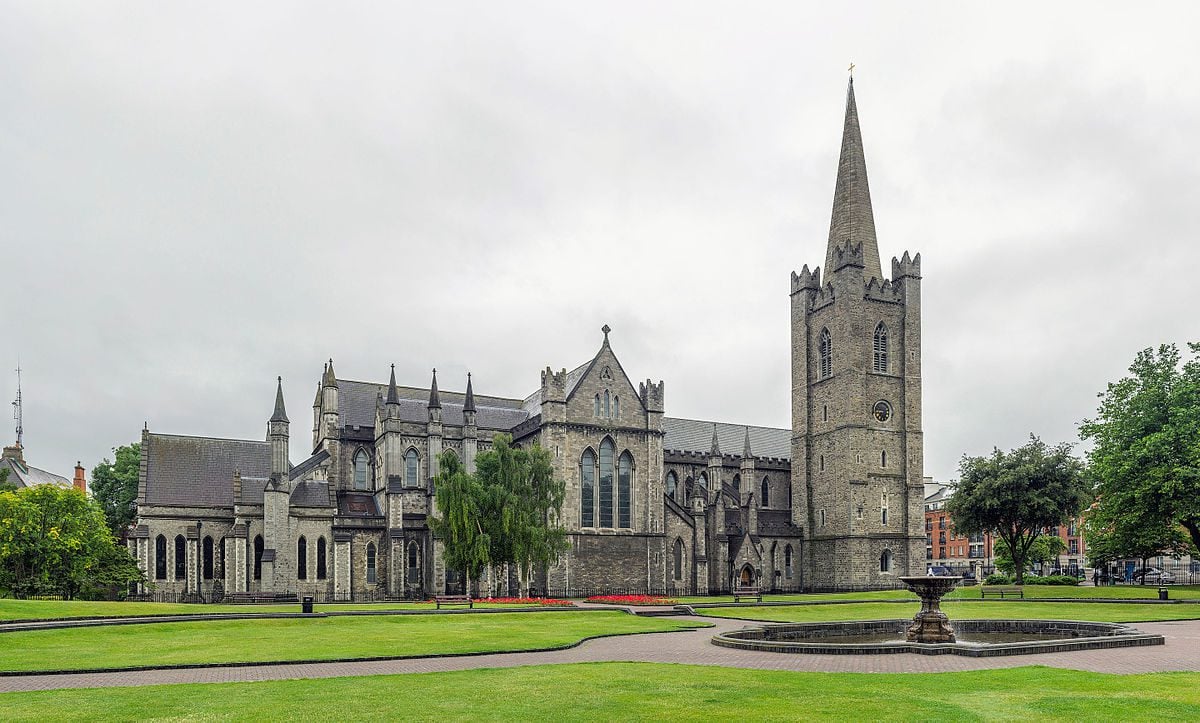
The temple is one of the few structures that have survived from the Middle Ages. Today it is the cathedral of not only Dublin, but all of Ireland. Tourists note the unusual architecture of the capital-the cathedral was built in the Neo-Gothic style, and the decoration dates back to the Victorian era. The temple attracts huge windows, elaborate carvings on wooden furniture, high ceilings, characteristic of the Gothic form, and an organ.
Interesting fact! During the reign of various monarchs, the temple flourished and fell into disrepair. Finally, the temple complex was restored in the middle of the 16th century, where knighthood ceremonies were held.
Every November, the cathedral hosts special events in honor of the Irish Memorial Day.
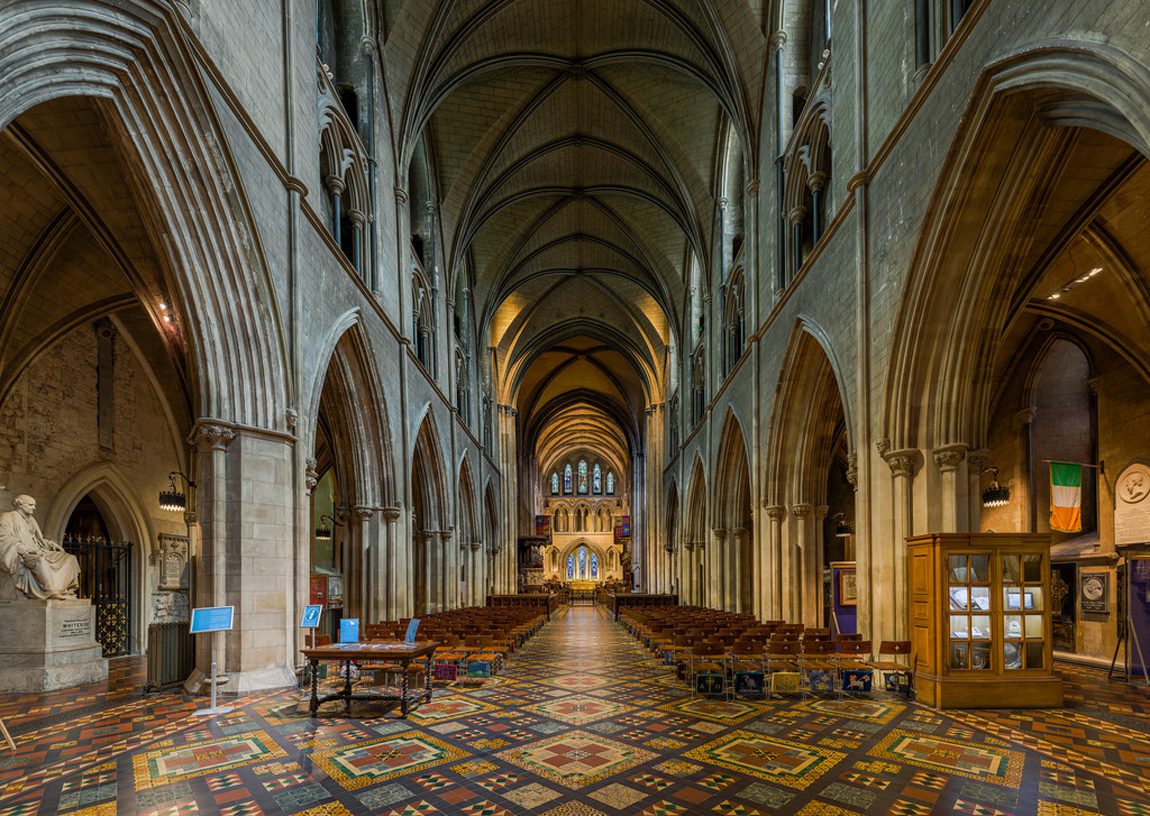
Before visiting the temple, carefully read the schedule on the official website. Entrance during the service is prohibited, and if you do not arrive at the beginning of the service, you will have to pay 9 € for adults, 8 € for students and pensioners, 3.5 € for children aged 5-12 years.
Practical information:
- адрес: Saint Patrick’s Cathedral, Saint Patrick’s Close, Dublin 8;
- the tour schedule should be viewed on the official website;
- website: www.stpatrickscathedral.ie.
Do you expect to travel to Dublin, discover the sights and history of Ireland? Bring comfortable shoes and, of course, a camera. After all, you will have to go an impressive distance and take a lot of colorful pictures.

